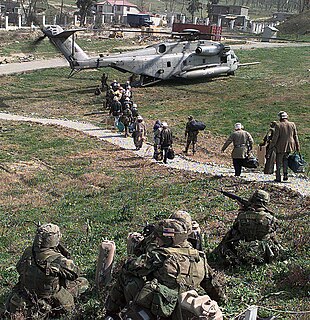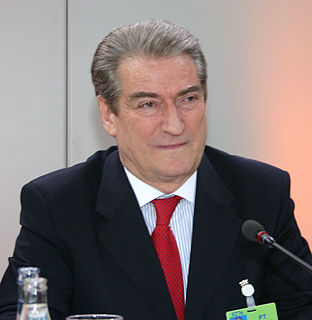Albania is a unitary parliamentary constitutional republic, where the President of Albania is the head of state and the Prime Minister of Albania the head of government in a multi-party system. The executive power is exercised by the Government and the Prime Minister with its Cabinet. Legislative power is vested in the Parliament of Albania. The judiciary is independent of the executive and the legislature. The political system of Albania is laid out in the 1998 constitution. The Parliament adopted the current constitution on 28 November 1998. Due to political instability, the country has had many constitutions during its history. Albania was initially constituted as a monarchy in 1913, briefly a republic in 1925, then it returned to a democratic monarchy in 1928. It later became a socialist republic until the restoration of capitalism and democracy in 1992.

The President of Albania, officially styled the President of the Republic of Albania, is the head of state, commander-in-chief of the military and the representative of the unity of the Albanian people.

The Democratic Party of Albania is a conservative political party in Albania. The party became the leading party in the governing coalition following the 2005 parliamentary elections. It is an associate member of the European People's Party (EPP) and a full member of the International Democrat Union and Centrist Democrat International. Rilindja Demokratike is the party's official newspaper.
The Unity for Human Rights Party is a social-liberal political party in Albania supporting the Greek minority. Founded in 1992, it represents Albania's minorities and is mainly related to the Greek minority, and is the political continuation of Omonoia. It works with Omonoia, MEGA and other Greek parties in Albania at national elections, under a Greek bloc. The party is currently led by Vangjel Dule, who held the party's only seat in Parliament until 2017.
A presidential election is the election of any head of state whose official title is President.

The Demochristian Party of Albania is a small Christian democratic political party in Albania.

The Parliament of Albania or Kuvendi is the unicameral representative body of the citizens of the Republic of Albania; it is Albania's legislature. The Parliament is composed of not less than 140 members elected to a four-year term on the basis of direct, universal, periodic and equal suffrage by secret ballot. The Parliament is presided over by a Speaker of the Parliament, who is assisted by at least one deputy speaker. The electoral system is based on party-list proportional representation. There are 12 multi-seat constituencies, corresponding to the country's administrative divisions.

The Albanian Civil War, also known as the Albanian rebellion, Albanian unrest or the Pyramid crisis, was a period of civil disorder in Albania in 1997, sparked by Ponzi scheme failures. The government was toppled and more than 2,000 people were killed. It is considered to be either a rebellion, a civil war, or a rebellion that escalated into a civil war.
Local elections were held in Albania on 18 February 2007. They came after threats to boycott the elections by opposition parties because of concerns over fraudulent voting rolls; because of this, the elections were rescheduled from 20 January 2007 to the new date on very short notice, a move which was criticised by observers. The elections were seen as crucial to the future of Albanian integration with the European Union.

Kosovo and Metohija, officially the Autonomous Province of Kosovo and Metohija, known as short Kosovo or simply Kosmet, refers to the region of Kosovo as defined in the Constitution of Serbia. The territory of the province is disputed between Serbia and the self-proclaimed Republic of Kosovo, the latter of which has de facto control. The region had functioned as part of Serbia for most of the period between 1912 and 1999.
In 1991, the Socialist Party of Albania, with specific social democratic ideology took control of the country through democratic elections. One year later the Democratic Party of Albania won the new elections. After 1990, Albania has been seeking a closer relationship with the West. What followed were deliberate programs of economic and democratic reform, but Albanian inexperience with capitalism led to the proliferation of pyramid schemes – which were not banned due to the corruption of the government. Chaos in late 1996 to early 1997, as a result of the collapse of these pyramid schemes, alarmed the world and prompted the influx of international peacekeeping forces. In 1995, Albania was accepted into the Council of Europe and requested membership in NATO and is a potential candidate country for accession to the European Union. The workforce of Albania has continued to emigrate to Western countries, especially Greece and Italy.
Parliamentary elections were held in Albania on 24 June 2001. The result was a victory for the ruling Socialist Party of Albania, which won 73 of the 140 seats, resulting in Ilir Meta remaining Prime Minister. Voter turnout was 53.6%.

The Albanian local elections of 2011 took place on 8 May 2011 in Albania. Electors were asked to elect their municipality's mayor, municipal council members, municipal unit mayor, and municipal unit members. The elections were administrated by the Central Election Commission of Albania. Only 9 of the 384 winning candidates were women.
The Albanian local elections in 1992 was the first local election held in Albania. The elections were held on 26 July 1992 and the winner was the Democratic Party of Albania.
The Albanian local elections in 1996 was the second local election held in Albania. The elections were held on 20 and 27 October 1996 and the winner was the Democratic Party of Albania.
Pyramid schemes in Albania were Ponzi schemes that precipitated the 1997 unrest in Albania. They started operations in 1991 with the first being formed by Hajdin Sejdia,. After starting works for the construction of an alleged hotel in central Tirana, he escaped to Switzerland with several million dollars. The area became known as Hajdin Sejdia's Hole. Later it was filled by crews to create a local park, but it was taken over by the local prostitution scene. Following these events, some creditors were liquidated while others were not. It is alleged that most of the sums are still held in foreign banks.
Albanian partial local elections of 2013 were held on September 1, 2013, and November 3, 2013. Following the Parliamentary Elections in June, and the new Albanian Government composition announced on July 31, 2013, there were reelections in four municipalities, three of them rural.
The elections were administrated by the Central Election Commission of Albania.
Local elections were held in Albania on 21 June 2015. Voters elected mayors, municipal council members, municipal unit mayors and municipal unit members. The Central Election Commission of Albania was responsible for administrating the elections. These were the first local elections in Albania since substantial administrative reforms legislated in 2014 reduced the number of municipalities in the country to 61.

The 2017 Albanian opposition protests were a series of anti-government protests, largely in Tirana, which centered around government corruption, the illicit drug situation in Albania, fear of electoral fraud in the parliamentary elections, and alleged manipulation of the voting process by the Socialist government.








